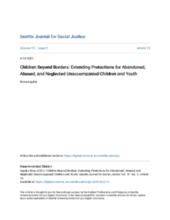Displaying 261 - 270 of 2176
"The U.S. Customs and Border Protection agency is still expelling most migrants under a Trump policy indefinitely closing the border during the pandemic to 'nonessential' travel," says this article from the Los Angeles Times, "though the Biden administration in February announced it would exempt unaccompanied children."
The aim of this study was to examine the academic trajectories of children in out-of-home care (OOCH) and whether kinship care has a protective effect relative to nonkin foster care.
This study utilized secondary data from National Survey of Child and Adolescent Well-being (NSCAW II) to examine the experiences of 298 youth and their caregivers.
In this article, researchers Philip Fisher, Joan Lombardi, and Nat Kendall-Taylor present data from the RAPID-EC U.S. national survey of families with young children and look back at three overarching findings from the first year of the survey.
The current study assessed the efficacy of the Attachment and Biobehavioral Catch-up intervention for reducing behavior problems in 122 children adopted internationally.
This webinar sheds light on the often under-the-radar work and impact of more than 3,000 Family Resource Centers in the U.S.
"Researchers now estimate that more than 40,000 children in the United States have lost a parent to Covid-19," says this article from Vox.
This study aimed to better understand the role that Court-Appointed Special Advocates (CASAs) play in the lives of transition-age youth (TAY) by asking participants about the nature of their relationships with their CASAs, and the extent to which their CASAs helped prepare them for independent living.
"During the pandemic, video chats replaced in-person visits between parents and their children placed in foster care" says this article from the Marshall Project. "The effects could linger for years."
This article argues that the U.S. Congress should make changes to extend protections under Special Immigrant Juvenile Status (SIJS). These implementations would give effect to the legislative intent behind SIJS, which is to protect the particularly vulnerable group of unaccompanied children and youth.

